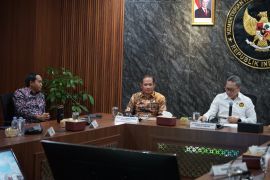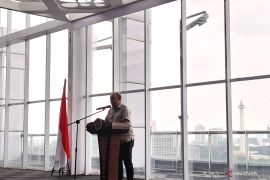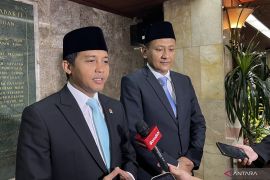Raising the "7-Day Reverse Repo Rate" needs to be considered to prevent foreign capital outflow, Bhima Yudhistira from the Institute for Development of Economic and Financial (Indef) said here on Tuesday.
"The foreign exchange reserve would finally be depleted to stabilize rupiah. Bank Indonesia may not rely only on the foreign exchange reserve as an instrument," Bhima said.
He said Bank Indonesia still has room to raise its benchmark interest rate by 25-50 basis point from the present level of 4.25 percent.
If the benchmark interest rate is raised the yield of financial instruments in the country would also increase that could prevent capital from flowing out and release of rupiah assets could be prevented, he said.
Bank Indonesia Governor Agus Martowardojo has said adjustment is open in the benchmark interest rate when rupiah weakening becomes a threat to the stability of financial system or inflation target of 2.5-4.5 percent.
Adjustment of benchmark interest rate would be based on data, Agus said.
He said the Central Bank would also announce the position of the country`s foreign exchange, adding, it would be an another blow to rupiah if the foreign exchange reserve declined.
By the end of March, 2018, the country`s foreign exchange reserve was US$126 billion or 2.06 percent smaller than it was in the previous month.
On Monday, Senior Deputy Governor of the Central Bank Mirza Adityaswara said falling value of the national currency in the past several week was only temporary.
Rupiah has continued to weaken crossing the level of 14,000 per dollar on Tuesday, but it would not crash as in 2013, Mirza Adityaswara said in Yogyakarta.
Mirza said the main cause of the volatility of the currency is the policy of the U.S. central bank, The Federal Reserve, which raised its benchmark interest rate (Fund Rate) last March. The Fed still plans to gradually raise the Fund Rate two more times this year.
"We are in the middle of a situation when the providers of foreign exchange in the world raised their interest rate and a number of central banks in the world already raised their interest rates," Mirza said.
He said in 2013, when the Fed only began to give signals that it would raise its fund rate, rupiah already crashed with a depreciation of 26 percent in the whole year. Similarly in 2015, rupiah fell with a big bang on The Fed raising the interest rate of its benchmark interest rate for the first time.
"In 2018, there was a minor jolt, but we believe it would not long as we have succeeded in keeping the macro economic indicators well under control such as inflation and fiscal condition. At the same time the government has continued to launch deregulation measures," he said.
The Central Bank sees that the U.S. interest rate would still climb up until it reached 3 percent from now 1.75 percent.
"The U.S. interest rate would continue to go up. Now it is 1.75 percent. Perhaps it would head for a 3 percent level.
(T.SYS/B/H-ASG/B003)
Reporter: antara
Editor: Heru Purwanto
Copyright © ANTARA 2018












